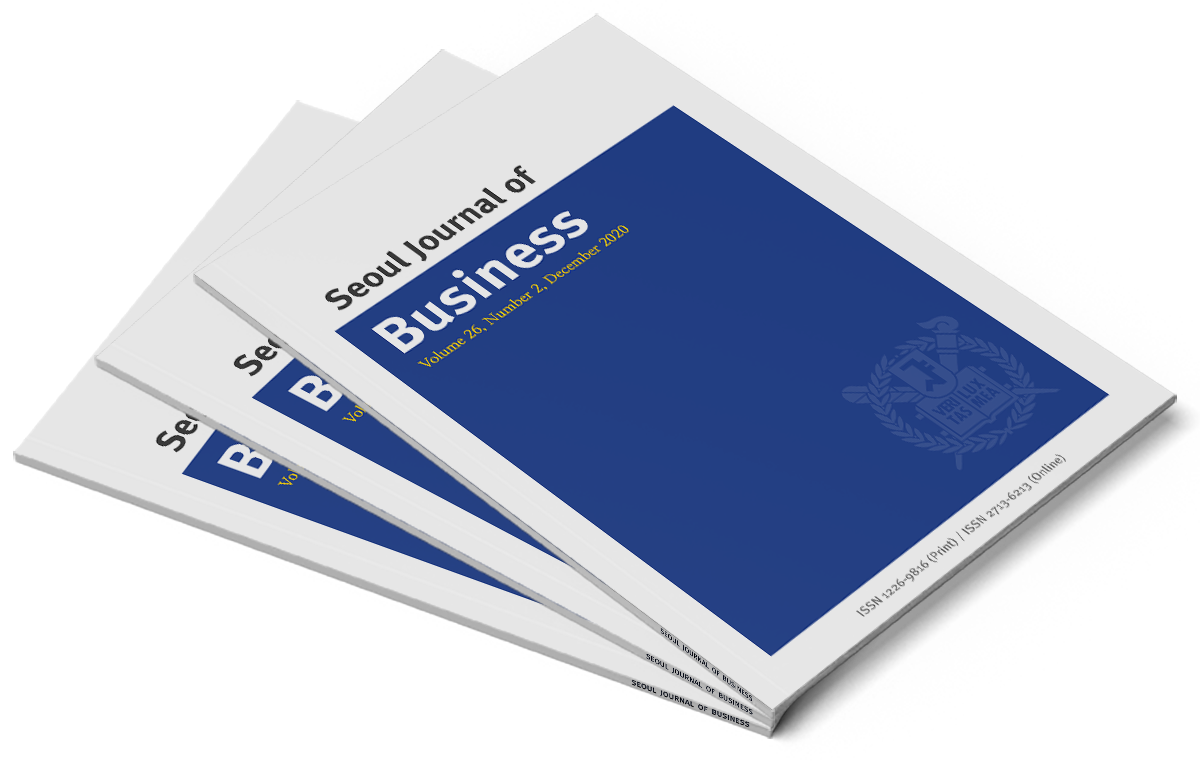Recent Issues
Vol.31/2 (2026, December)
Feeling Ostracized And Powerless: The Moderating Role Of Job Crafting
Author TAE HYUN KIM, YE KANG KIM, HYEONGKI KIM, SUJIN LEE
Keywords ostracism; sense of power; job crafting; power dependence theory
Download
Ostracism is a negative social event that diminishes employees’ sense
of power. Drawing on power dependence theory, this study investigates
how employees’ prior engagement in crafting either social or structural job
resources differentially moderates this relationship. We hypothesize that
employees who previously increased social resources experience a weaker
negative impact of ostracism on power, whereas those who increased
structural resources experience a stronger effect. An experiment study
supported these hypotheses. This research advances the ostracism, job
crafting, and power literatures by showing how pre-ostracism job crafting
behaviors can either mitigate or exacerbate ostracism’s negative effects on
sense of power.
Vol.31/2 (2026, December)
Reactive Disclosure to Environmental Rating Downgrades
Author KEUMAH JUNG, HYE-YEONG LEE, SINAE KIM, HEE-YEON SUNWOO
Keywords sustainability reporting, ESG ratings, carbon emissions, greenwashing.
Download
Analyzing Korean listed firms from 2014 to 2022, we report that 1)
firms are less likely to issue sustainability reports following environmental
rating downgrades, and 2) when they do, they include less green
terminology in the reports. Notably, these disclosure patterns are only
salient for firms with multiple downgrades (i.e., when multiple ESG
raters issue downgrades). Interestingly, downgraded firms with more
green terminology reduce carbon emissions to a lesser degree than those
with less green terminology. Our results suggest that downgraded firms’
reactive disclosures are more of a strategic response than a demonstration
of genuine commitment to environmental improvement.
Vol.31/2 (2026, December)
Effects of AI Explanations on Human-AI Collaboration: An Experimental Study on Decision Performance and Reliance
Author SOL JIN, SANGKYU RHO
Keywords Explainable AI (XAI), decision support systems, collaborative decision-making performance, intent classification, experimental study
Download
This study examines how AI explanations affect human-AI collaborative
decision-making. We test whether explainable AI (XAI) improves accuracy,
speed, confidence, and reliance when distinguishing correct from incorrect
AI suggestions. Using call center agents in three conditions―human only,
human with AI, and human with XAI―we evaluate decisions made with
classifiers and LIME-based explanations. Results show that explanations
significantly increase decision accuracy, reduce overreliance on AI, and
promote appropriate non-reliance. These findings emphasize the critical
role and applicability of AI explanations in human-AI collaboration and
contribute practical insights into designing AI assistants.
Vol.31/1 (2025, June)
How Do Business Groups’ Patenting Activities Affect Product Markets? Evidence from Korea
Author Taejin Jung, Sehee Kim
Keywords Diversified business groups, Chaebols, Innovation, Patents, Industry dynamics
Download
This study examines how business group affiliation influences corporate innovation and its economic implications in product markets. Using patent data from Korean public firms, we find that business group-affiliated firms (i.e., chaebols) file more patents than their non-chaebol counterparts. We explore two potential mechanisms underlying this difference: the responsiveness of R&D investment to growth opportunities and intra-group knowledge spillovers. We find suggestive evidence that chaebol firms may allocate R&D more efficiently in response to investment opportunities and benefit from innovation generated by affiliated firms. Moreover, the positive effects of patents on future profitability are more pronounced for chaebol firms. Finally, while chaebols’ patenting activities are associated with increases in their market share, they does not appear to contribute to overall industry growth. Taken together, our findings highlight the role of innovation in reinforcing chaebols’ competitive advantage and market dominance.
Vol.31/1 (2025, June)
Multi-unit chains, market competition, and product portfolio scope: Performance implications from the hospital industry
Author Joon Mahn Lee
Keywords Chain organization, local competition, product scope, firm heterogeneity, hospital
Download
We attempt to identify the benefits of multi-unit chain membership and study the boundary conditions of the effects of chain affiliation. We test our arguments in the context of the U.S. hospital industry by examining the number of hospitals affiliated with hospital systems. We find that the number of hospitals in the system is positively associated with establishment performance. We find that the level of market competition positively moderates the relationship between the number of hospitals and establishment performance. Lastly, we find that the level of product scope negatively moderates the relationship between the number of hospitals and establishment performance.
Vol.31/1 (2025, June)
Developing a Scale for Measuring Employer Brand Personality in Korean Companies: Applying Aaker’s Brand Personality Model to the Recruitment Context
Author Jiyoung Choi, Heejae Kim, Sung-Choon Kang, Jimin Yeom
Keywords Employer image, employer brand personality, applicant attraction, recruitment strategies
Download
Classic recruitment theory suggests that applicant attraction is predicted by objective job attributes, critical recruitment contacts, and employer image. However, research on employer image has been relatively scarce. This study develops a measure of Employer Brand Personality (EBP) based on Aaker’s brand personality model and tests its validity in Korea. Using data from undergraduate and MBA students in a Korean university, we found that a five-factor model (sincerity, excitement, competence, ruggedness, and peacefulness) effectively describes the EBP of Korean companies. Results also show that EBP significantly impacts organizational attractiveness and intention to apply. Theoretical and practical implications for developing recruitment strategies are discussed.
Vol.30/2 (2024, December)
Purchase Intention of Content Consumers: Role of Customer Engagement
Author Namrata Ladha, Prateek Maheshwari, Vivek Sharma
Keywords Namrata Ladha, Prateek Maheshwari, Vivek Sharma
Download
This study generates new knowledge on how digital content marketing affects customer engagement and purchase intention. While Phase I of the study is conducted on Indian youngsters to understand their expectations of brand’s content by employing the Theory of Consumption Values, for Phase II of the study, a hypothetical content (stimuli) is developed based on the findings of Phase I. Thereafter, the stimuli is used to gauge consumers’ attitude towards content marketing, engagement, and purchase intention. The study uncovers customers’ expectations from digital marketers and provides significant insights into what works and what doesn’t in content marketing.
Vol.30/2 (2024, December)
Mean-Centered Moderated Regression Models: A Reassessment of Their Role in Moderation Analysis
Author Sang-June Park, Youjae Yi
Keywords moderation, collinearity, main effect, simple effect, mean-centered model
Download
Moderated regression models (MRMs) are widely used in business research to investigate how the relationship between a predictor and an outcome changes across different levels of a moderator. A common issue in MRM is multicollinearity, and mean-centering is often applied to address this problem, though its effectiveness is debated. This study reveals that the t-test for the main effect of the focal predictor at the mean of a moderator in a mean-centered MRM is equivalent to testing the overall simple effect of the predictor as a population-level effect, independent of specific moderator levels. This insight provides a fresh perspective on the utility of mean-centering in MRMs. Beyond mitigating multicollinearity, mean-centering offers a practical and efficient approach for understanding the average impact of a predictor across varying contextual conditions. By assessing both main effects and interaction effects within a single model, researchers can derive more nuanced insights into complex business phenomena, ultimately supporting more informed strategic decision-making.
Vol.30/2 (2024, December)
Job Crafting in Response to Workplace Ostracism: The Mediating Role of Anxiety
Author Ye Kang Kim, Hyeongki Kim, Yoonho Noh, Jinho Lee, Sujin Lee
Keywords ostracism, job crafting, affective events theory, anxiety
Download
Workplace ostracism places individuals in challenging situations, but ostracized employees may overcome the negative effects. This research explains how ostracism induces anxiety, which leads to specific job crafting behavior: increasing social resources (ISR). A two-wave longitudinal survey supports our hypotheses that ostracized employees feel more anxiety, anxiety is positively related to ISR, and anxiety mediates the relationship between ostracism and ISR. This study enriches the ostracism literature by linking ostracism and ISR, and reveals that workplace ostracism affects job crafting through anxiety. Our study suggests that those ostracized can overcome their negative situation partly through job crafting.
Vol.30/2 (2024, December)
Spillover Effects of Financial Reporting on Public Firms’ Corporate Investment: Evidence from Structural Estimation
Author Chongho Kim
Keywords spillover effects, financial reporting, corporate investment, structural estimation
Download
I examine whether public firms’ financial reporting has spillover effects on the amount and efficiency of other public firms’ investment and quantify the relative importance of these indirect spillover effects vis-a-vis the direct effects due to firms’ own financial reporting. Using structural estimation, I examine the effect of financial reporting on aggregate output from the public corporate sector’s investment and estimate that a significant portion―roughly half of the total effect of financial reporting and a quarter of the marginal effect of an incremental change in financial reporting precision―is due to spillover effects.
Seoul Journal of Business

ISSN 1226-9816 (Print)
ISSN 2713-6213 (Online)
ISSN 2713-6213 (Online)


